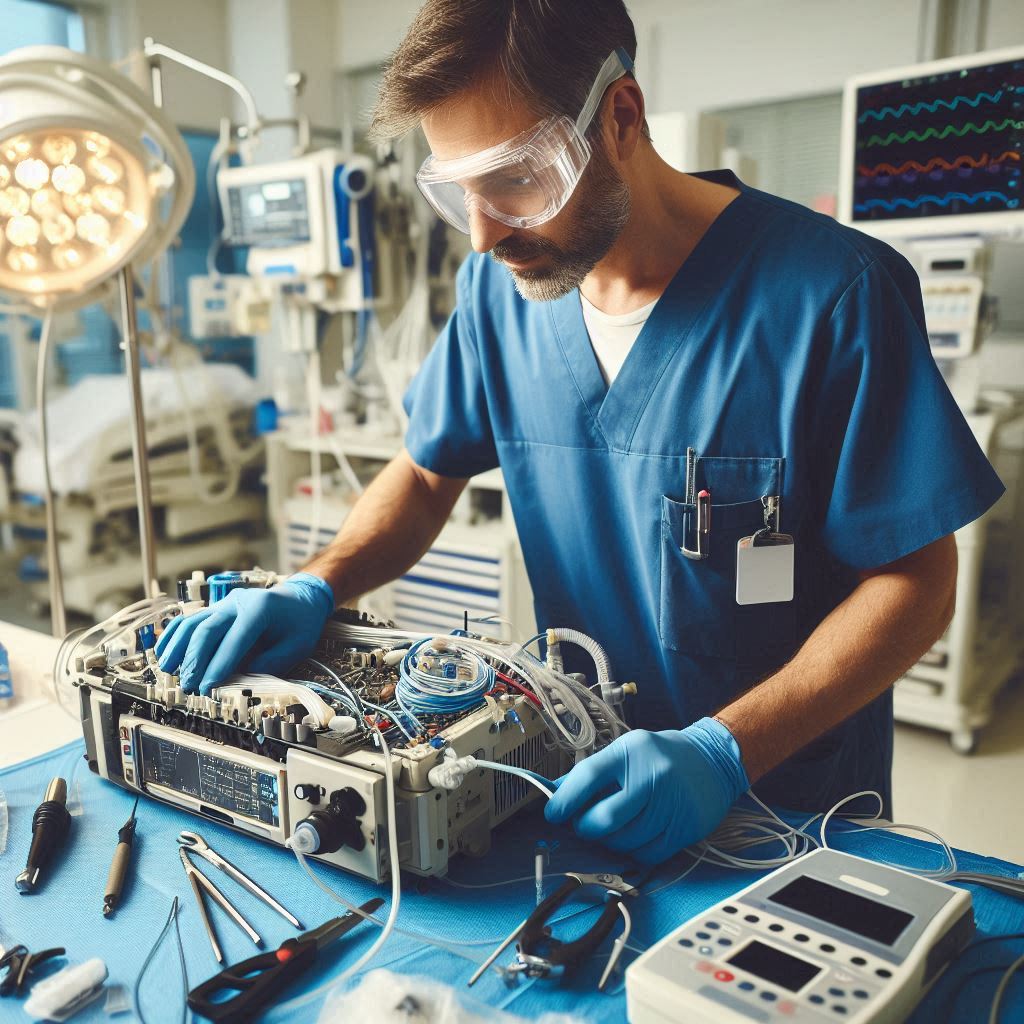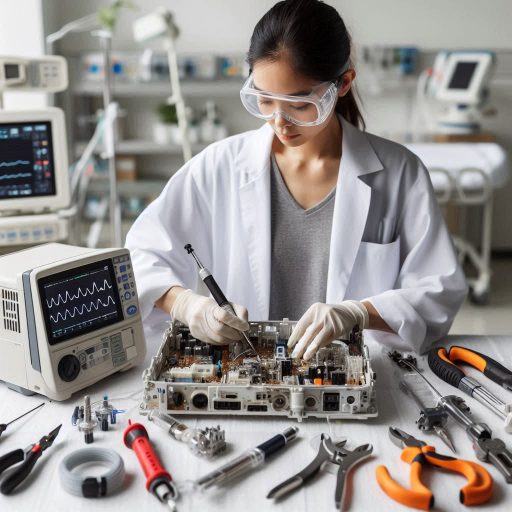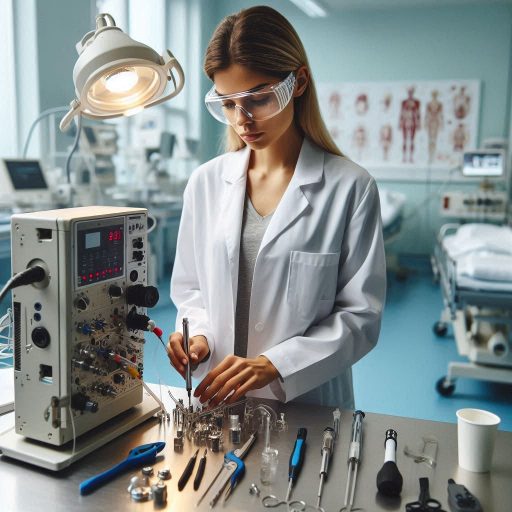Introduction
The field of biomedical equipment technology involves the critical task of maintaining, repairing, and calibrating medical devices for Biomedical Equipment Technician Career Growth
Biomedical equipment technicians (BMETs) work with complex machinery like MRI machines, infusion pumps, and ventilators, ensuring these devices operate efficiently and safely.
Their responsibilities include diagnosing equipment issues, performing routine maintenance, and adhering to safety standards.
This role is essential in healthcare settings, as it directly impacts the quality of patient care and the smooth operation of medical facilities.
Career growth in the biomedical equipment technician field is crucial for several reasons.
As medical technology evolves, BMETs must continually update their skills and knowledge to keep pace with new advancements.
This ongoing development is essential for staying relevant in the field and enhancing job performance.
Career growth allows BMETs to explore advanced roles, such as equipment management, clinical engineering, or specialized technical positions.
These opportunities often come with increased responsibilities, higher salaries, and greater job satisfaction.
Additionally, pursuing further education and certifications can lead to career advancement and specialization.
BMETs who invest in professional development can gain expertise in emerging technologies and assume leadership roles within their organizations.
Education and Training Requirements
Starting Point: High School Diploma or Equivalent
A high school diploma or equivalent is the foundational requirement for a career as a Biomedical Equipment Technician (BMET).
During high school, focus on subjects like math, science, and electronics to build a strong base.
These subjects are crucial as they provide fundamental knowledge applicable to the field of biomedical technology.
Some high schools offer vocational programs or courses related to electronics and healthcare, which can provide a head start.
Achieving good grades and showing an interest in technical subjects can set you on the right path toward further education and career opportunities.
Advancing with an Associate’s Degree
An Associate‘s degree in Biomedical Equipment Technology is often the next step for aspiring BMETs.
This degree provides specialized knowledge and practical skills needed to work with medical equipment.
Courses in electronics, medical device repair, and healthcare technology form the core of the curriculum.
An Associate‘s degree typically takes about two years to complete and includes hands-on training, which is crucial for developing practical skills.
This educational background prepares you for entry-level positions and lays the groundwork for further career advancement.
Importance of Certification and On-the-Job Training
Certification is a critical component for career growth in the BMET field.
Earning certifications such as the Certified Biomedical Equipment Technician (CBET) demonstrates your expertise and commitment to the profession.
Certification often requires passing an exam and meeting specific educational and experience criteria.
It validates your skills and can make you a more attractive candidate for employment and promotion.
On-the-job training complements formal education and certification.
Practical experience gained through internships or entry-level positions is invaluable.
It allows you to apply theoretical knowledge in real-world scenarios, solve actual problems, and gain hands-on skills.
Working under the guidance of experienced professionals helps you learn the nuances of equipment maintenance, repair, and troubleshooting.
Read: Impact of Drones on Surveying and Mapping
Job Responsibilities
Inspecting, Maintaining, and Repairing Medical Equipment
Career growth as a Biomedical Equipment Technician (BMET) involves mastering key responsibilities, such as inspecting, maintaining, and repairing medical equipment.
Regular inspections ensure that medical devices function correctly and comply with safety standards.
Performing routine maintenance helps prevent equipment failures and extends the lifespan of devices.
BMETs must be skilled in repairing equipment when issues arise.
This involves diagnosing problems, replacing faulty parts, and calibrating devices to restore proper function.
Effective repair work minimizes downtime and ensures that medical equipment remains reliable for patient care.
Troubleshooting and Diagnosing Issues
Troubleshooting and diagnosing issues are crucial skills for career advancement in the BMET field.
When equipment malfunctions, BMETs must quickly identify the root cause of the problem.
This requires a strong understanding of medical device operations and a methodical approach to problem-solving.
Diagnosing issues involves using diagnostic tools and interpreting error codes or symptoms.
BMETs often work closely with medical staff to understand the symptoms and operational context.
Accurate diagnosis and effective troubleshooting are essential for maintaining high-quality patient care and ensuring the safety of medical equipment.
Upgrading and Testing Equipment to Ensure Functionality
Upgrading and testing equipment are vital for staying current with technological advancements and maintaining functionality.
BMETs must regularly update software and hardware components to enhance device performance and ensure compatibility with new technologies.
These upgrades can include installing new modules, applying firmware updates, or integrating advanced features.
Testing equipment after upgrades or repairs is essential to verify that it operates correctly.
BMETs conduct rigorous tests to confirm that devices meet performance standards and safety regulations.
Regular testing ensures that equipment remains reliable and effective in delivering accurate diagnostics and treatments.
Read: Top Surveying and Mapping Technician Employers
Career Advancement Opportunities
One of the key aspects of building a successful career as a biomedical equipment technician is exploring opportunities for career advancement.
In this field, there are various paths you can take to progress in your career and reach higher levels of expertise and responsibility.
Let’s take a closer look at some of the career advancement opportunities available to biomedical equipment technicians:
Specialization in a specific type of equipment or medical specialty
- One way to advance your career as a biomedical equipment technician is to specialize in a specific type of equipment or medical specialty.
- By focusing your expertise on a particular area, such as imaging equipment or surgical instruments, you can become a go-to expert in that field.
- Specializing can open up new opportunities for advanced positions and higher pay, as employers value specialized knowledge and skills.
- You may also have the chance to work on cutting-edge technologies and make a real impact in the healthcare industry.
Progression to supervisory or management roles
- Another way to advance your career as a biomedical equipment technician is to progress to supervisory or management roles.
- With experience and proven leadership skills, you may have the opportunity to lead a team of technicians and oversee department operations.
- Supervisory and management roles come with increased responsibility and the chance to make strategic decisions that impact the success of the department.
- These positions also offer the opportunity to mentor and train junior technicians, contributing to the growth of the team and the organization.
Pursuing higher education for advanced positions
- For biomedical equipment technicians looking to take their career to the next level, pursuing higher education can be a valuable step.
- Advanced degrees or certifications in biomedical engineering, healthcare technology management.
- With a higher level of education, you may be eligible for roles such as clinical engineering manager.
- Continuing education and professional development can help you stay current with industry trends and advancements.
Overall, career advancement opportunities in the biomedical equipment technician field are diverse and offer multiple paths for growth and development.
Whether you choose to specialize in a specific area, progress to supervisory roles, or pursue higher education.
There are plenty of options to explore as you advance your career in this rewarding field.
Read: Safety Tips for Field Surveying Technicians

Networking and Professional Development
Joining Associations and Organizations in the Field
Joining professional associations and organizations is crucial for career growth in the biomedical equipment technician field.
These groups offer numerous benefits, including access to industry resources, educational materials, and networking opportunities.
Membership in organizations such as the Association for the Advancement of Medical Instrumentation (AAMI) or the Biomedical Equipment Technician Association (BETA) can enhance your professional development.
These associations often provide access to industry standards and best practices, helping you stay current with technological advancements.
Additionally, they offer certification programs, continuing education opportunities, and professional development resources.
Being an active member can boost your credentials and keep you informed about the latest trends in biomedical equipment technology.
Attending Conferences, Workshops, and Seminars
Attending conferences, workshops, and seminars is another effective way to advance your career.
These events offer valuable opportunities to learn from industry leaders and experts.
Conferences often feature presentations on the latest technologies, emerging trends, and case studies relevant to biomedical equipment.
Workshops and seminars provide hands-on experience and practical knowledge that can enhance your technical skills.
They also offer insights into new tools and techniques that can improve your performance in the field.
By participating in these events, you gain exposure to cutting-edge developments and expand your understanding of complex topics.
Building Relationships with Industry Professionals for Mentorship
Building relationships with industry professionals is essential for career advancement.
Networking with experienced BMETs can provide guidance, support, and mentorship.
Establishing connections with professionals can open doors to new opportunities and career advice.
Seek mentors who can offer insights into navigating the biomedical equipment field and advancing your career.
A mentor can provide valuable feedback, share their experiences, and help you set career goals.
They can also offer advice on handling challenging situations and advancing within your organization or the industry.
Engage with professionals through networking events, industry associations, and online forums.
Building a strong professional network can lead to job referrals, collaborative projects, and growth opportunities.
Actively participating in discussions and staying engaged with the community helps establish your presence and credibility in the field.
Read: Networking Tips for Surveying and Mapping Professionals
Salary and Benefits
Average Salary Range for Biomedical Equipment Technicians
The average salary for Biomedical Equipment Technicians (BMETs) varies based on experience, location, and employer.
In general, BMETs can expect to earn between $50,000 and $70,000 annually.
Entry-level positions may start around $45,000, while experienced professionals can earn upwards of $80,000.
Salaries also depend on factors like certifications, education, and the complexity of the job.
Geographic location plays a significant role in salary differences.
BMETs in urban areas or regions with high demand for healthcare services may earn more.
Additionally, specialized roles or positions requiring advanced skills often offer higher salaries.
When evaluating salary offers, consider how these factors impact potential earnings.
Benefits: Healthcare, Retirement Plans, and Paid Time Off
Healthcare benefits are a key component of the compensation package for BMETs.
Employers typically provide health insurance covering medical, dental, and vision care.
This coverage helps manage healthcare costs and ensures access to necessary services.
Retirement plans are another important benefit.
Many employers offer 401(k) or 403(b) plans with employer matching contributions.
These plans support long-term financial security and help BMETs save for retirement.
The specific details of retirement plans, such as matching rates and investment options, can vary by employer.
Paid time off (PTO) is also included in the benefits package.
PTO typically consists of vacation days, sick leave, and personal days.
Adequate PTO allows BMETs to rest, recover, and manage personal needs without losing income.
Generous PTO policies enhance work-life balance and job satisfaction.
Opportunities for Bonuses and Incentives Based on Performance
Many employers offer bonuses and incentives based on performance for BMETs.
Performance-based bonuses reward exceptional work and can significantly boost overall earnings.
These bonuses may be awarded annually or quarterly, depending on the employer‘s policies.
Incentives may also include additional perks such as professional development opportunities or special project bonuses.
Some employers provide performance-based raises or promotions, recognizing and rewarding top performers.
These incentives motivate BMETs to excel in their roles and contribute to their long-term career growth.
Performance bonuses and incentives can vary widely among employers and roles.
Evaluate potential job offers to understand the bonus structure and how performance is measured.
These opportunities can enhance your overall compensation and career satisfaction.
Explore Further: Understanding Telecommunications Networks and Systems
Transform Your Career Today
Unlock a personalized career strategy that drives real results. Get tailored advice and a roadmap designed just for you.
Start NowWork Environment and Job Outlook
Employment Settings for Biomedical Equipment Technicians
Biomedical Equipment Technicians (BMETs) find employment in various settings, each offering unique experiences and responsibilities.
Hospitals, clinics, and research facilities are common workplaces for BMETs.
In hospitals, BMETs maintain and repair critical medical equipment used in patient care.
They work closely with healthcare professionals to ensure devices function correctly, which is essential for accurate diagnoses and treatments.
Clinics offer a more focused environment where BMETs manage equipment specific to outpatient care.
This setting often involves routine maintenance and calibration of diagnostic devices.
Research facilities present a different challenge, where BMETs support advanced equipment used in scientific studies.
These environments require expertise in high-tech and specialized machinery.
BMETs in research settings often work on equipment that supports groundbreaking medical research and development.
Expected Job Growth in the Field
The job outlook for BMETs is promising, with substantial growth projected in the coming years.
According to recent industry reports, the demand for BMETs is expected to increase by about 10% over the next decade.
This growth is driven by the expanding healthcare sector and the aging population, which necessitates more medical equipment and maintenance.
Technological advancements also contribute to job growth.
As medical devices become more sophisticated, the need for skilled technicians who can manage and repair these systems rises.
Additionally, healthcare facilities continue to expand, creating more opportunities for BMETs.
Challenges and Opportunities in the Evolving Healthcare Industry
The evolving healthcare industry presents both challenges and opportunities for BMETs.
One significant challenge is staying current with rapid technological advancements.
Medical devices are continually evolving, requiring technicians to update their skills and knowledge regularly.
Continuing education and training are essential to keep pace with these changes.
Another challenge is managing the increasing complexity of medical equipment.
Advanced technologies often come with intricate systems and software, making maintenance and repairs more demanding.
BMETs must be adept at troubleshooting complex issues and understanding sophisticated diagnostic tools.
Despite these challenges, the field offers numerous opportunities.
The integration of new technologies opens doors for BMETs to work with cutting-edge equipment.
Innovations such as telemedicine and remote monitoring systems create new areas for specialization and expertise.
Additionally, the ongoing growth in healthcare facilities means more job openings and career advancement opportunities.
Delve into the Subject: How to Troubleshoot Common Network Issues
Skills and Qualities for Success
Technical Proficiency in Equipment Repair and Maintenance
Technical proficiency is crucial for biomedical equipment technicians (BMETs) as they handle complex medical devices daily.
Mastery of equipment repair and maintenance ensures that devices function correctly and safely.
BMETs must understand the inner workings of various machines, from MRI scanners to infusion pumps.
They use diagnostic tools and technical manuals to troubleshoot and resolve issues effectively.
Routine maintenance tasks are equally important.
BMETs perform regular checks and calibrations to prevent equipment malfunctions.
This proactive approach helps avoid unexpected breakdowns and extends the lifespan of medical devices.
Technicians must stay updated with technological advancements and new equipment to maintain their expertise.
Continued learning through training and certifications enhances their ability to handle emerging technologies.
Technical proficiency not only supports the functionality of medical devices but also contributes to patient safety and care quality.
Problem-Solving and Critical Thinking Skills
Problem-solving and critical thinking skills are essential for BMETs when diagnosing and addressing equipment issues.
These skills allow technicians to identify problems quickly and determine the most effective solutions.
BMETs often encounter complex technical issues that require thoughtful analysis and creative problem-solving.
Effective problem-solving involves analyzing symptoms, isolating variables, and testing potential solutions.
Technicians must interpret data from diagnostic tools and apply their knowledge to fix problems efficiently.
Critical thinking enables BMETs to assess various solutions and choose the best approach.
This skill set is crucial in high-pressure situations where timely and accurate repairs are necessary.
Developing strong problem-solving and critical thinking skills enhances a BMET‘s ability to manage diverse challenges.
It also boosts their confidence in handling unexpected issues and contributes to their overall effectiveness in the role.
Strong Communication and Interpersonal Skills
Strong communication and interpersonal skills are vital for BMETs when working with healthcare professionals.
Technicians must clearly explain technical issues and repair procedures to non-technical staff.
Effective communication ensures that medical teams understand the status of equipment and any potential impact on patient care.
Interpersonal skills help BMETs build positive relationships with healthcare providers.
Technicians must collaborate with doctors, nurses, and other staff to address equipment needs and ensure smooth operations.
Being approachable and responsive fosters a cooperative work environment and enhances teamwork.
Additionally, BMETs often provide training and support to healthcare staff on proper equipment use.
Strong communication skills are essential for delivering clear instructions and answering questions.
These interactions build trust and ensure that equipment is used safely and effectively.
Uncover the Details: Networking Tips for Biomedical Equipment Technicians
Conclusion
The field of biomedical equipment technology involves the critical task of maintaining, repairing, and calibrating medical devices.
Biomedical equipment technicians (BMETs) work with complex machinery like MRI machines, infusion pumps, and ventilators, ensuring these devices operate efficiently and safely.
Their responsibilities include diagnosing equipment issues, performing routine maintenance, and adhering to safety standards.
This role is essential in healthcare settings, as it directly impacts the quality of patient care and the smooth operation of medical facilities.
Career growth in the biomedical equipment technician field is crucial for several reasons.
As medical technology evolves, BMETs must continually update their skills and knowledge to keep pace with new advancements.
This ongoing development is essential for staying relevant in the field and enhancing job performance.
Career growth allows BMETs to explore advanced roles, such as equipment management, clinical engineering, or specialized technical positions.
These opportunities often come with increased responsibilities, higher salaries, and greater job satisfaction.
Additionally, pursuing further education and certifications can lead to career advancement and specialization.
BMETs who invest in professional development can gain expertise in emerging technologies and assume leadership roles within their organizations.




